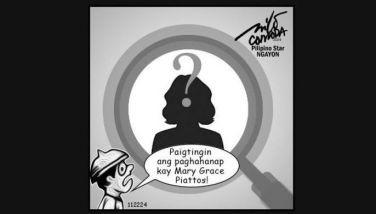SSS vows to freeze hike in members’ contributions
December 21, 2003 | 12:00am
The Social Security System (SSS) has given assurance that a rate hike in the contributions of its estimated 25 million members will not be implemented in 2004, an election year.
"Even if we wanted to, which we do, the SSS would not get the nod of the national leadership," Corazon S. de la Paz, SSS president and chief executive officer said. "We have no other option but to dig deep into our resources and do a lot better than the past years."
If SSS would effect a rate increase, another one- to two-percent rate hike would be added from the present level of 9.4 percent of a member’s monthly earnings. In fact, the total target increase required to keep the state pension fund viable beyond 2015 is 14 percent by 2005 to 20 percent after 2011.
Nonetheless, the SSS would have to wait for a new administration to take over before it could lobby for a rate hike. "But that is also a distant possibility as the new administration would not like to make an unpopular order as a rate hike affecting 25 million individuals," another SSS official pointed out.
De la Paz said the agency would have no choice but to "stretch its resources to the limit" and hope that the economy improves dramatically next year. SSS recorded an investment income of P11 billion in 2002 and estimates this to slip to P9.4 billion this year.
The pension fund will also be forced to work for the continued reduction of the gap between the members’ contributions versus benefits issued. So far, the contribution growth has recorded a favorable growth this year compared to 2002.
In the last 10 months, members’ contribution increased more than 15 percent to P32.78 billion as a result of an intensified collection campaign and a one percent increase in employers’ share in the contribution rates.
Last March, SSS implemented a one percent increase in the employers’ share in the contribution rate from 5.03 percent to 6.03 percent, bringing total contributions from 8.4 percent to 9.4 percent of the employees’ monthly salary. The employees’ share remained at 3.33 percent.
SSS last implemented a rate hike in the members’ contribution in 1980 although it was based on its original proposal in 1972. In contrast, the rate of member benefits increased more than 10 times.
Benefits extended to SSS members have been outpacing contribution collections and investment earnings. Benefit payments grew by more than 15 percent while contribution collection grew by a mere 3.56 percent in 2002.
This year, SSS expects to earn between P2.8 billion to P3 billion, barely hitting its target. In 2002, it earned P500 million as it tapped into its reserves due to low contributions that could not match the benefit payments.
"Even if we wanted to, which we do, the SSS would not get the nod of the national leadership," Corazon S. de la Paz, SSS president and chief executive officer said. "We have no other option but to dig deep into our resources and do a lot better than the past years."
If SSS would effect a rate increase, another one- to two-percent rate hike would be added from the present level of 9.4 percent of a member’s monthly earnings. In fact, the total target increase required to keep the state pension fund viable beyond 2015 is 14 percent by 2005 to 20 percent after 2011.
Nonetheless, the SSS would have to wait for a new administration to take over before it could lobby for a rate hike. "But that is also a distant possibility as the new administration would not like to make an unpopular order as a rate hike affecting 25 million individuals," another SSS official pointed out.
De la Paz said the agency would have no choice but to "stretch its resources to the limit" and hope that the economy improves dramatically next year. SSS recorded an investment income of P11 billion in 2002 and estimates this to slip to P9.4 billion this year.
The pension fund will also be forced to work for the continued reduction of the gap between the members’ contributions versus benefits issued. So far, the contribution growth has recorded a favorable growth this year compared to 2002.
In the last 10 months, members’ contribution increased more than 15 percent to P32.78 billion as a result of an intensified collection campaign and a one percent increase in employers’ share in the contribution rates.
Last March, SSS implemented a one percent increase in the employers’ share in the contribution rate from 5.03 percent to 6.03 percent, bringing total contributions from 8.4 percent to 9.4 percent of the employees’ monthly salary. The employees’ share remained at 3.33 percent.
SSS last implemented a rate hike in the members’ contribution in 1980 although it was based on its original proposal in 1972. In contrast, the rate of member benefits increased more than 10 times.
Benefits extended to SSS members have been outpacing contribution collections and investment earnings. Benefit payments grew by more than 15 percent while contribution collection grew by a mere 3.56 percent in 2002.
This year, SSS expects to earn between P2.8 billion to P3 billion, barely hitting its target. In 2002, it earned P500 million as it tapped into its reserves due to low contributions that could not match the benefit payments.
BrandSpace Articles
<
>
- Latest
- Trending
Trending
Latest
Trending
Latest
Recommended




























